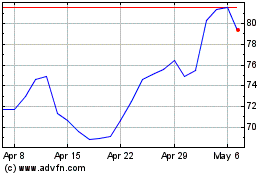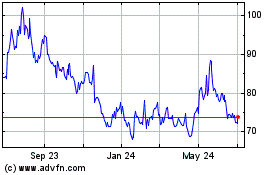By Jing Yang, Liza Lin and Keith Zhai
Pressure is mounting on Alibaba's cloud-computing division after
years of breakneck expansion, as competition in the industry
intensifies and political issues hurt the Chinese company's ability
to win business overseas and government contracts at home.
Alibaba investors have banked on cloud computing to drive
significant growth, as competition in the company's main e-commerce
business heats up. In recent months, however, the cloud unit has
parted ways with a major customer, was given the cold shoulder by
some Chinese government clients and has overhauled its
organizational structure, people familiar with the matter said.
Alibaba Group Holding Ltd. reported last week that cloud
computing revenue grew 37% in the quarter ended March 31 from the
same period a year earlier, the slowest quarterly growth since it
went public on the New York Stock Exchange in 2014. The company
said the slowdown was due to the loss of a major Chinese internet
client's international business due to "non-product related
requirements."
That client was ByteDance Ltd., the owner of the social-video
app TikTok, which terminated a deal to store its international data
on Alibaba Cloud, some of the people said. When ending the
relationship, ByteDance bought servers from Alibaba, they said.
The moves reflected Beijing-based ByteDance's desire to handle
its own fast-expanding cloud-computing needs, the people said.
Growing U.S. pressure on the use of Chinese-owned computer services
to store Americans' data accelerated the process, one of the people
said. In August, the Trump administration warned against the use of
Chinese cloud-computing services including Alibaba's.
Alibaba Cloud declined to comment on its relationship with
Bytedance.
Bytedance, which counts Carlyle Group Inc. and General Atlantic
among its backers and is one of the world's most valuable tech
startups, is building an in-house cloud-computing capability to
host its services globally. The company has been gradually
unwinding its business on the mainland with Alibaba Cloud, people
familiar with the matter said. Bytedance's operations include the
popular news-aggregator app Jinri Toutiao, Alibaba Cloud
customer.
That would deal a further blow to Alibaba Cloud, which has
plowed billions of dollars into the business and just turned
profitable in the past two quarters on the basis of adjusted
earnings before interest, taxes, amortization and depreciation.
"We understand that Alibaba Cloud still has material exposure to
Bytedance's domestic cloud workload, and worry that 'Bytedance
risk' could rear its head again in future quarters," Bernstein
analyst Robin Zhu said in a note Tuesday.
Bytedance was caught up in growing U.S.-China tensions last
year, as the Trump administration tried to ban and force the sale
of its TikTok app, citing concerns about the security of data
collected from its millions of American users. TikTok attracted
more than 81 million downloads in the U.S. last year, data from
mobile-analytics firm Sensor Tower shows. A U.S. court blocked the
ban, and the sale was shelved indefinitely as President Biden
reviewed his predecessor's policy toward the company.
In a U.S. federal court hearing last year, a senior ByteDance
executive said the company hosted TikTok's U.S. users' data in the
U.S. on cloud services provided by third parties including Alphabet
Inc.'s Google and Microsoft Corp. The Chinese firm had kept a
backup copy of TikTok's U.S. data in data centers in Singapore,
where one of the cloud providers it used was Alibaba, a person
familiar with the matter said.
Alibaba was the first Chinese technology giant to make the foray
into cloud computing -- renting processing power and data-storage
services to external clients -- by leveraging the already enormous
computing needs of its e-commerce marketplace. Cloud brought in
$2.6 billion in sales in the March quarter, compared with $24.6
billion for Alibaba's core commerce business. It is now the largest
provider of cloud-infrastructure service in China and the-fourth
largest in the world after Amazon.com Inc.'s Amazon Web Services,
Microsoft's Azure and Google Cloud, according to research firm
Canalys.
Yet Huawei Technologies Co. has been chipping away at Alibaba
Cloud's market share at home. The Chinese telecom giant almost
doubled its market share in China to 16% last year from 2019,
according to Canalys. Alibaba's share fell to 41% from 44% over the
same period, Canalys data showed.
IDC, another industry-data provider, shows a smaller decline in
Alibaba Cloud's market share in China over the same period.
Last month, Alibaba Cloud revamped its organizational structure
to add more geographic managers to give local teams across China
more power and accountability for growing sales and retaining
customers, people familiar with the company said. The move was seen
by some in the company as a direct response to Huawei's rising
market share, the people said.
China's cloud-computing industry is a restricted one. Regulators
require overseas cloud providers to form joint ventures to operate
in the country. That has helped Alibaba grow, but the company faces
new hurdles as Beijing cracks down on the e-commerce giant, its
financial-technology affiliate Ant Group Co. and founder Jack
Ma.
Regulators hit Alibaba with a record $2.8 billion fine in April
for abusing its dominant position over rivals and merchants on its
e-commerce platform. Late last year, they halted Ant's $34 billion
IPO as it neared the finish line; this year they forced the fintech
giant to restructure as a financial holding company subject to
more-stringent regulations.
Alibaba Cloud in recent months has run into difficulty winning
new contracts or even securing meetings with some of its government
and state-owned enterprise clients, according to people familiar
with the matter, as regulators scrutinize its e-commerce business
and Ant Group.
The company was the top cloud contractor for central-government
departments in the first quarter of 2019, according to state-run
Xinhua News Agency.
"As seen in recent quarters, Alibaba Cloud's revenues have been
primarily driven by the continuous growth from customers in the
internet, finance and retail industries, and the public sector," a
spokeswoman for the unit said.
Alibaba Cloud isn't completely shut out -- it has landed some
government contracts in the past few months, according to
government procurement records and company releases.
Still, Alibaba's recent regulatory troubles could cast a shadow
on decision-making by local governments and hurt the company's
ability to win future contracts in the government cloud market,
said Charlie Dai, a cloud-industry analyst at research firm
Forrester Research.
"The fierce competition in the government market and the
complexity in private cloud markets are some of the major
challenges toward Alibaba Cloud's business growth in the domestic
market," Mr. Dai said.
Write to Jing Yang at Jing.Yang@wsj.com, Liza Lin at
Liza.Lin@wsj.com and Keith Zhai at keith.zhai@wsj.com
(END) Dow Jones Newswires
May 23, 2021 07:14 ET (11:14 GMT)
Copyright (c) 2021 Dow Jones & Company, Inc.
Alibaba (NYSE:BABA)
Historical Stock Chart
From Mar 2024 to Apr 2024

Alibaba (NYSE:BABA)
Historical Stock Chart
From Apr 2023 to Apr 2024
